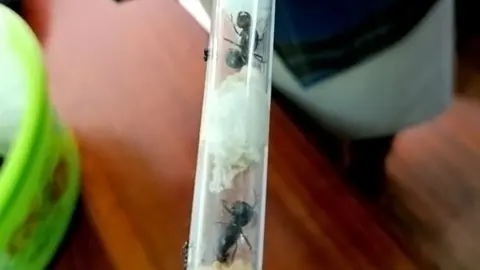In a striking intersection of wildlife crime and biodiversity conservation, Kenyan authorities recently made headlines by intercepting a group of smugglers attempting to transport hundreds of prized insects, including various rare ant species. This operation underscores the ongoing struggle against wildlife trafficking and the critical need for vigilance in protecting Kenya’s rich ecological heritage.
The Operation
In early April 2025, officers from the Kenya Wildlife Service (KWS), alongside their partners in the National Police Service, conducted a tip-off-led operation near Nairobi’s Jomo Kenyatta International Airport. Intelligence reports indicated the presence of a smuggling ring dealing in endangered insect species, which has gained notoriety among collectors and enthusiasts globally. The extent of this trade highlights a concerning trend where nature’s smallest creatures are trafficked for enormous profits, often to meet the demand of exotic pet markets.
Upon interception, KWS officials discovered hundreds of meticulously packaged insects, primarily consisting of rare ant species that include the famous leafcutter ants from the Atta genus. These ants are highly sought after due to their fascinating behaviors and impressive colony structures. The authorities apprehended multiple suspects believed to be part of a larger network, signaling both the sophistication of the smuggling operation and the urgent need for enhanced measures to combat wildlife trafficking.
Rising Concern for Biodiversity
Kenya is renowned for its biodiversity, housing a plethora of insect species that play critical roles in ecosystems, such as pollination and soil aeration. However, like other forms of wildlife, insects are increasingly targeted by traffickers aiming to profit from the global demand for exotic pets and collecting.
Insects remain one of the least understood and protected groups in wildlife trade, leading to limited legal frameworks for their conservation. The illegal trade threatens not only individual species but potential ecological balances that these insects help maintain. Reports indicate that the demand for rare insects has been rising, particularly in parts of Asia and Europe, emphasizing the urgency of protective measures.
Legislative and Enforcement Challenges
Enforcement agencies worldwide face challenges in preventing wildlife trafficking due to the vastness of the illegal market and the complexities involved in enforcing laws concerning less charismatic species, such as insects. The Convention on International Trade in Endangered Species of Wild Fauna and Flora (CITES) has provisions for some insect species, but many remain unregulated at both national and international levels.
Kenya’s Wildlife Conservation and Management Act provides the legal framework for conserving and protecting wildlife, including insects. However, the diverse nature of smuggling operations often necessitates international cooperation, advanced training for enforcement officers, and public awareness campaigns to help curb the demand for trafficked animals.
The Road Ahead
As the recent bust demonstrates, the fight against wildlife trafficking requires an ongoing commitment from both government agencies and the public. Heightened awareness regarding the impacts of insect smuggling on biodiversity can lead consumers to make informed choices, ultimately curbing demand for such illicit activities.
Efforts to educate local communities on the ecological importance of insects, coupled with stricter penalties for trafficking, could bolster conservation initiatives. Moreover, fostering alliances with international organizations could enhance surveillance and response capabilities, ultimately safeguarding not only Kenya’s unique insect species but also its rich biodiversity.
The recent discovery of hundreds of prized insects in transit serves as a wake-up call that wildlife trafficking is not only a crisis for larger species but for the entire web of life, including the intricate and often-overlooked world of insects. Combatting this challenge is vital if we are to ensure the preservation of Kenya’s unique ecosystems for future generations.
Email Us on editorial@nnafrica.com













